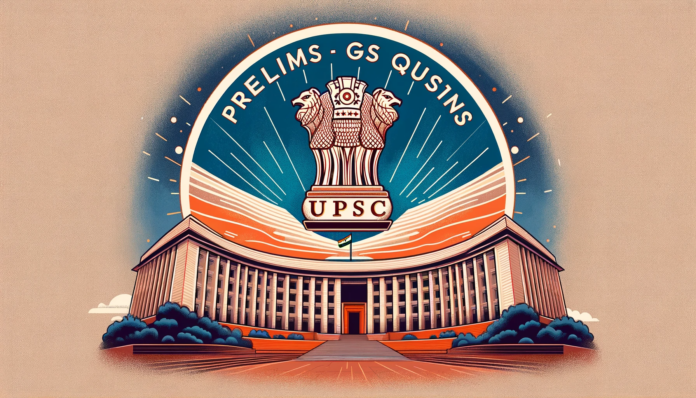The UPSC Civil Services Examination is a cornerstone of Indian bureaucratic recruitment, drawing countless aspirants each year. In preparation for UPSC 2024, it’s crucial to tackle challenging areas, especially in the Prelims General Studies (GS) paper. We bring you an expert breakdown of five such tricky questions, enhancing your readiness for this competitive exam.
1. Methane Hydrate Deposits
Question: Which of the following statements are true about the deposits of methane hydrate? a. Methane hydrate are rare deposits found only around the ring-of-fire region in the pacific ocean. b. CO2 gets oxidised into methane in the atmosphere after two decades.
- Options: Only 1, Only 2, Both 1 and 2, Neither 1 nor 2
- Answer: Neither 1 nor 2
Explanation: Methane hydrates are not confined to the Pacific’s Ring of Fire but are found globally in deep-sea sediments and permafrost. In the atmosphere, methane (CH₄) oxidizes into carbon dioxide (CO₂) over approximately two decades, contrary to the statement.
2. Organ Transplant Regulations in India
Question: Which of the following statements are true about organ transplant regulations in India? a. Organ donation and transplantation are regulated by the Transplantation Human Organs Act (THOA), 1994. b. THOA mandates domicile requirement to register as an organ recipient in India. c. The act allows those above 65 years of age to receive an organ for transplantation from deceased donors.
- Options: Only 1 statement is true, Only 2 statements are true, All of them are true, None of them are true
- Answer: Only 2 statements are true
Explanation: THOA indeed regulates organ donation and transplantation, and there’s no domicile requirement for registering as an organ recipient. Also, people above 65 can receive organs from deceased donors.
3. India’s Treaty Memberships
Question: India is a member of how many of these treaties? a. Missile Technology Control Regime (MTCR) b. Outer Space Treaty (OST) c. Treaty on the Prohibition of Nuclear Weapons (TPNW)
- Options: Only 1 treaty, Only 2 treaties, All three, None
- Answer: Only 1 treaty
Explanation: India is a member of the MTCR but not of the Treaty on the Prohibition of Nuclear Weapons. While India is a signatory to the OST, it doesn’t equate to full membership.
4. Quantitative Easing
Question: What is the concept of “Quantitative Easing,” often employed by central banks during economic downturns?
- Options: Increasing interest rates to curb inflation, Injecting money into the economy by purchasing financial assets, Reducing government spending to control deficits, Implementing trade restrictions to boost domestic industries
- Answer: Injecting money into the economy by purchasing financial assets
Explanation: Quantitative Easing involves central banks buying financial assets to increase money supply and stimulate economic activity, particularly during downturns.
5. Significance of the Keeling Curve
Question: In the context of climate change, what is the significance of the ‘Keeling Curve’?
- Options: Global distribution of carbon emissions, Historical trend of atmospheric carbon dioxide concentrations, Impact of deforestation on biodiversity, Correlation between ocean temperatures and sea level rise
- Answer: Historical trend of atmospheric carbon dioxide concentrations
Explanation: The Keeling Curve graphically represents the increasing levels of CO2 in the Earth’s atmosphere since 1958, a key indicator in climate change studies.
Understanding Methane Hydrate Deposits: Methane hydrates, often found in deep-sea sediments and permafrost, are ice-like structures where methane is encased within a water lattice. Contrary to common belief, these deposits are not restricted to the Pacific’s Ring of Fire but are rather widespread. Furthermore, in the atmosphere, methane gets oxidized into CO2 over about two decades, not vice versa.
Insights into Organ Transplant Regulations in India: Organ donation and transplantation in India are governed by the Transplantation of Human Organs Act (THOA), 1994. Notably, the Modified National Organ Transplantation Guidelines have eliminated the domicile requirement for organ recipient registration. Additionally, individuals above 65 can receive organs from deceased donors, highlighting inclusive healthcare policies.
India’s Participation in International Treaties: India’s strategic and diplomatic stance is reflected in its selective treaty memberships. It’s a member of the Missile Technology Control Regime (MTCR) but not the Treaty on the Prohibition of Nuclear Weapons (TPNW). Additionally, while India signed the Outer Space Treaty (OST), it isn’t considered a full member.
Decoding Quantitative Easing: During economic downturns, central banks may resort to Quantitative Easing – a process of injecting money into the economy by purchasing financial assets like government bonds. This strategy aims to stimulate economic activity by boosting liquidity and encouraging investment and spending.
The Keeling Curve and Climate Change: The Keeling Curve, a pivotal element in climate change studies, depicts the historical trend of rising atmospheric carbon dioxide levels. Initiated in 1958, it’s an essential tool for understanding the impact of human activities on global climate patterns.
Preparing for UPSC 2024’s Prelims GS paper demands an in-depth understanding of complex topics. These expert insights into tricky questions provide a solid foundation for aspirants. Remember, consistent practice and staying updated with current affairs are key to mastering the UPSC challenge.





